Entrepreneurship: Small Business Management - Venture Analysis
VerifiedAdded on 2021/01/02
|12
|3984
|209
Report
AI Summary
This report provides a comprehensive analysis of entrepreneurship and small business management, beginning with a detailed examination of various entrepreneurial ventures, including micro, small, medium-sized, start-up, large company, social, and lifestyle firms, highlighting their similarities and differences. It assesses the significant impact of micro and small businesses on local, national, and international economies, emphasizing their role in innovation, adaptability, and employment generation, particularly in the context of Brexit and its economic consequences for the UK. The report also identifies key characteristics, traits, and skills essential for successful entrepreneurs, drawing examples from prominent figures like Peter Jones and Simon Cowell, and concludes by exploring environmental factors that either foster or hinder entrepreneurial activities. Desklib is a platform which provides all the necessary AI based study tools for students.

Entrepreneurship and
Small Business Management
Small Business Management
Paraphrase This Document
Need a fresh take? Get an instant paraphrase of this document with our AI Paraphraser
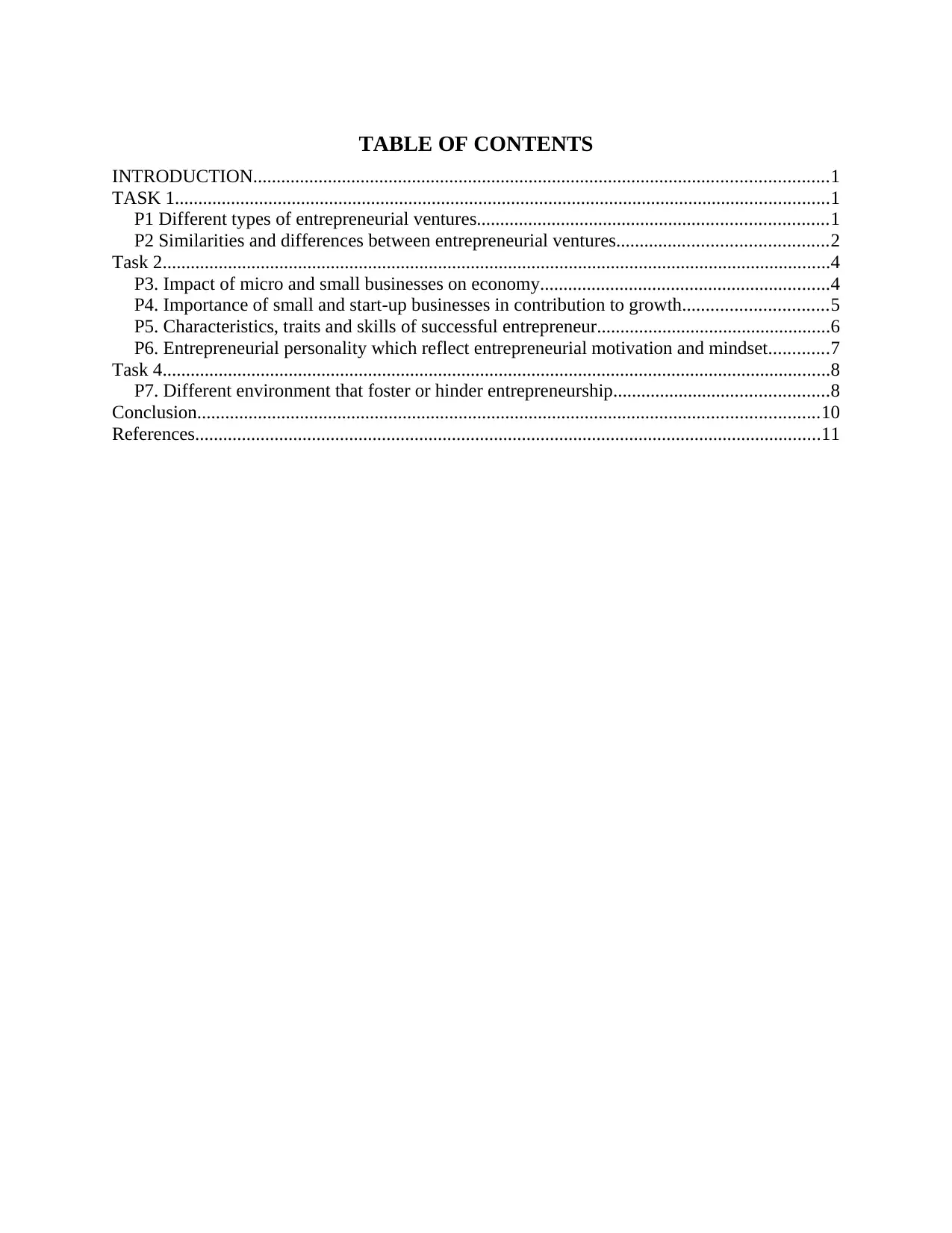
TABLE OF CONTENTS
INTRODUCTION...........................................................................................................................1
TASK 1............................................................................................................................................1
P1 Different types of entrepreneurial ventures...........................................................................1
P2 Similarities and differences between entrepreneurial ventures.............................................2
Task 2...............................................................................................................................................4
P3. Impact of micro and small businesses on economy..............................................................4
P4. Importance of small and start-up businesses in contribution to growth...............................5
P5. Characteristics, traits and skills of successful entrepreneur..................................................6
P6. Entrepreneurial personality which reflect entrepreneurial motivation and mindset.............7
Task 4...............................................................................................................................................8
P7. Different environment that foster or hinder entrepreneurship..............................................8
Conclusion.....................................................................................................................................10
References......................................................................................................................................11
INTRODUCTION...........................................................................................................................1
TASK 1............................................................................................................................................1
P1 Different types of entrepreneurial ventures...........................................................................1
P2 Similarities and differences between entrepreneurial ventures.............................................2
Task 2...............................................................................................................................................4
P3. Impact of micro and small businesses on economy..............................................................4
P4. Importance of small and start-up businesses in contribution to growth...............................5
P5. Characteristics, traits and skills of successful entrepreneur..................................................6
P6. Entrepreneurial personality which reflect entrepreneurial motivation and mindset.............7
Task 4...............................................................................................................................................8
P7. Different environment that foster or hinder entrepreneurship..............................................8
Conclusion.....................................................................................................................................10
References......................................................................................................................................11
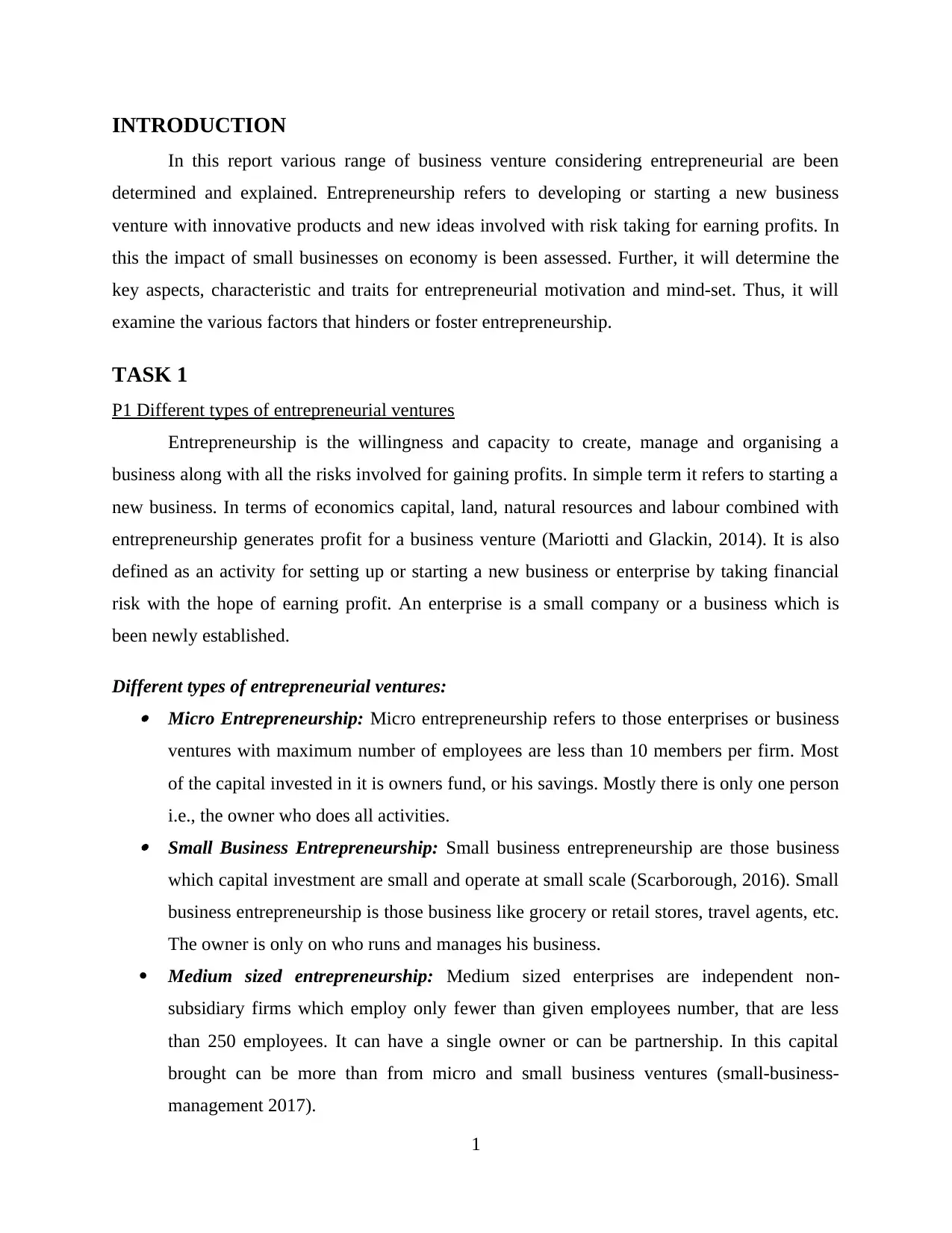
INTRODUCTION
In this report various range of business venture considering entrepreneurial are been
determined and explained. Entrepreneurship refers to developing or starting a new business
venture with innovative products and new ideas involved with risk taking for earning profits. In
this the impact of small businesses on economy is been assessed. Further, it will determine the
key aspects, characteristic and traits for entrepreneurial motivation and mind-set. Thus, it will
examine the various factors that hinders or foster entrepreneurship.
TASK 1
P1 Different types of entrepreneurial ventures
Entrepreneurship is the willingness and capacity to create, manage and organising a
business along with all the risks involved for gaining profits. In simple term it refers to starting a
new business. In terms of economics capital, land, natural resources and labour combined with
entrepreneurship generates profit for a business venture (Mariotti and Glackin, 2014). It is also
defined as an activity for setting up or starting a new business or enterprise by taking financial
risk with the hope of earning profit. An enterprise is a small company or a business which is
been newly established.
Different types of entrepreneurial ventures: Micro Entrepreneurship: Micro entrepreneurship refers to those enterprises or business
ventures with maximum number of employees are less than 10 members per firm. Most
of the capital invested in it is owners fund, or his savings. Mostly there is only one person
i.e., the owner who does all activities. Small Business Entrepreneurship: Small business entrepreneurship are those business
which capital investment are small and operate at small scale (Scarborough, 2016). Small
business entrepreneurship is those business like grocery or retail stores, travel agents, etc.
The owner is only on who runs and manages his business.
Medium sized entrepreneurship: Medium sized enterprises are independent non-
subsidiary firms which employ only fewer than given employees number, that are less
than 250 employees. It can have a single owner or can be partnership. In this capital
brought can be more than from micro and small business ventures (small-business-
management 2017).
1
In this report various range of business venture considering entrepreneurial are been
determined and explained. Entrepreneurship refers to developing or starting a new business
venture with innovative products and new ideas involved with risk taking for earning profits. In
this the impact of small businesses on economy is been assessed. Further, it will determine the
key aspects, characteristic and traits for entrepreneurial motivation and mind-set. Thus, it will
examine the various factors that hinders or foster entrepreneurship.
TASK 1
P1 Different types of entrepreneurial ventures
Entrepreneurship is the willingness and capacity to create, manage and organising a
business along with all the risks involved for gaining profits. In simple term it refers to starting a
new business. In terms of economics capital, land, natural resources and labour combined with
entrepreneurship generates profit for a business venture (Mariotti and Glackin, 2014). It is also
defined as an activity for setting up or starting a new business or enterprise by taking financial
risk with the hope of earning profit. An enterprise is a small company or a business which is
been newly established.
Different types of entrepreneurial ventures: Micro Entrepreneurship: Micro entrepreneurship refers to those enterprises or business
ventures with maximum number of employees are less than 10 members per firm. Most
of the capital invested in it is owners fund, or his savings. Mostly there is only one person
i.e., the owner who does all activities. Small Business Entrepreneurship: Small business entrepreneurship are those business
which capital investment are small and operate at small scale (Scarborough, 2016). Small
business entrepreneurship is those business like grocery or retail stores, travel agents, etc.
The owner is only on who runs and manages his business.
Medium sized entrepreneurship: Medium sized enterprises are independent non-
subsidiary firms which employ only fewer than given employees number, that are less
than 250 employees. It can have a single owner or can be partnership. In this capital
brought can be more than from micro and small business ventures (small-business-
management 2017).
1
⊘ This is a preview!⊘
Do you want full access?
Subscribe today to unlock all pages.

Trusted by 1+ million students worldwide
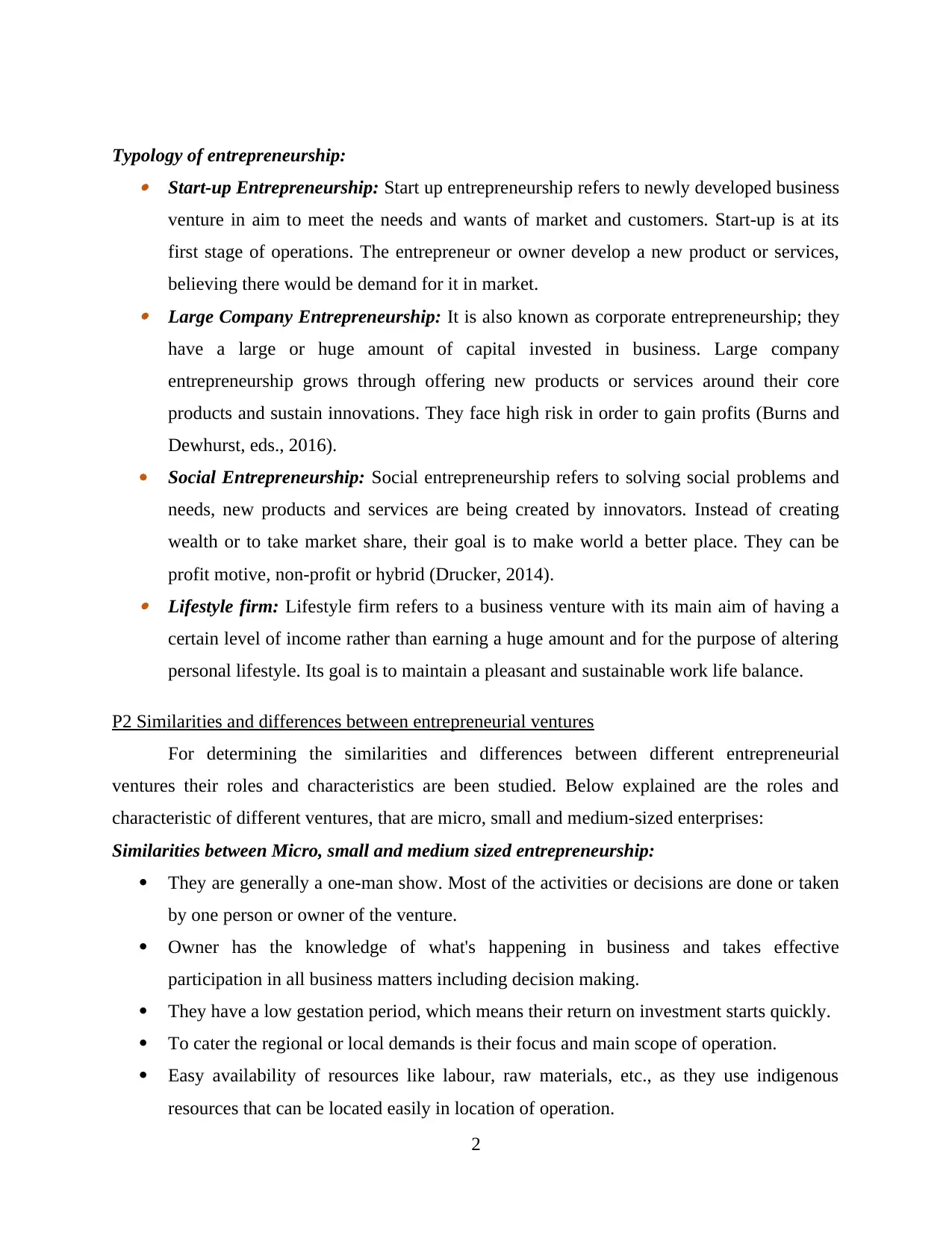
Typology of entrepreneurship: Start-up Entrepreneurship: Start up entrepreneurship refers to newly developed business
venture in aim to meet the needs and wants of market and customers. Start-up is at its
first stage of operations. The entrepreneur or owner develop a new product or services,
believing there would be demand for it in market. Large Company Entrepreneurship: It is also known as corporate entrepreneurship; they
have a large or huge amount of capital invested in business. Large company
entrepreneurship grows through offering new products or services around their core
products and sustain innovations. They face high risk in order to gain profits (Burns and
Dewhurst, eds., 2016).
Social Entrepreneurship: Social entrepreneurship refers to solving social problems and
needs, new products and services are being created by innovators. Instead of creating
wealth or to take market share, their goal is to make world a better place. They can be
profit motive, non-profit or hybrid (Drucker, 2014). Lifestyle firm: Lifestyle firm refers to a business venture with its main aim of having a
certain level of income rather than earning a huge amount and for the purpose of altering
personal lifestyle. Its goal is to maintain a pleasant and sustainable work life balance.
P2 Similarities and differences between entrepreneurial ventures
For determining the similarities and differences between different entrepreneurial
ventures their roles and characteristics are been studied. Below explained are the roles and
characteristic of different ventures, that are micro, small and medium-sized enterprises:
Similarities between Micro, small and medium sized entrepreneurship:
They are generally a one-man show. Most of the activities or decisions are done or taken
by one person or owner of the venture.
Owner has the knowledge of what's happening in business and takes effective
participation in all business matters including decision making.
They have a low gestation period, which means their return on investment starts quickly.
To cater the regional or local demands is their focus and main scope of operation.
Easy availability of resources like labour, raw materials, etc., as they use indigenous
resources that can be located easily in location of operation.
2
venture in aim to meet the needs and wants of market and customers. Start-up is at its
first stage of operations. The entrepreneur or owner develop a new product or services,
believing there would be demand for it in market. Large Company Entrepreneurship: It is also known as corporate entrepreneurship; they
have a large or huge amount of capital invested in business. Large company
entrepreneurship grows through offering new products or services around their core
products and sustain innovations. They face high risk in order to gain profits (Burns and
Dewhurst, eds., 2016).
Social Entrepreneurship: Social entrepreneurship refers to solving social problems and
needs, new products and services are being created by innovators. Instead of creating
wealth or to take market share, their goal is to make world a better place. They can be
profit motive, non-profit or hybrid (Drucker, 2014). Lifestyle firm: Lifestyle firm refers to a business venture with its main aim of having a
certain level of income rather than earning a huge amount and for the purpose of altering
personal lifestyle. Its goal is to maintain a pleasant and sustainable work life balance.
P2 Similarities and differences between entrepreneurial ventures
For determining the similarities and differences between different entrepreneurial
ventures their roles and characteristics are been studied. Below explained are the roles and
characteristic of different ventures, that are micro, small and medium-sized enterprises:
Similarities between Micro, small and medium sized entrepreneurship:
They are generally a one-man show. Most of the activities or decisions are done or taken
by one person or owner of the venture.
Owner has the knowledge of what's happening in business and takes effective
participation in all business matters including decision making.
They have a low gestation period, which means their return on investment starts quickly.
To cater the regional or local demands is their focus and main scope of operation.
Easy availability of resources like labour, raw materials, etc., as they use indigenous
resources that can be located easily in location of operation.
2
Paraphrase This Document
Need a fresh take? Get an instant paraphrase of this document with our AI Paraphraser
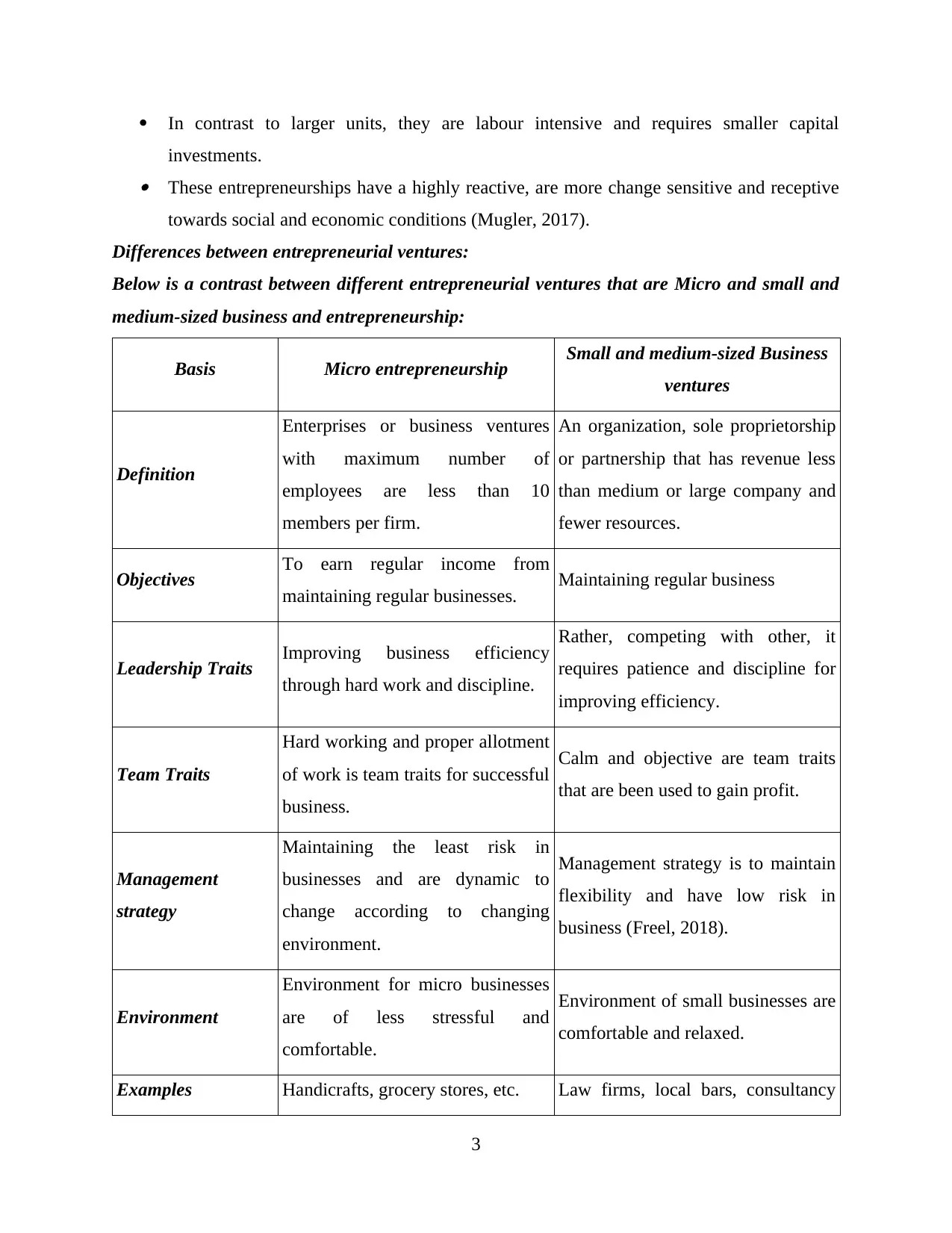
In contrast to larger units, they are labour intensive and requires smaller capital
investments. These entrepreneurships have a highly reactive, are more change sensitive and receptive
towards social and economic conditions (Mugler, 2017).
Differences between entrepreneurial ventures:
Below is a contrast between different entrepreneurial ventures that are Micro and small and
medium-sized business and entrepreneurship:
Basis Micro entrepreneurship Small and medium-sized Business
ventures
Definition
Enterprises or business ventures
with maximum number of
employees are less than 10
members per firm.
An organization, sole proprietorship
or partnership that has revenue less
than medium or large company and
fewer resources.
Objectives To earn regular income from
maintaining regular businesses. Maintaining regular business
Leadership Traits Improving business efficiency
through hard work and discipline.
Rather, competing with other, it
requires patience and discipline for
improving efficiency.
Team Traits
Hard working and proper allotment
of work is team traits for successful
business.
Calm and objective are team traits
that are been used to gain profit.
Management
strategy
Maintaining the least risk in
businesses and are dynamic to
change according to changing
environment.
Management strategy is to maintain
flexibility and have low risk in
business (Freel, 2018).
Environment
Environment for micro businesses
are of less stressful and
comfortable.
Environment of small businesses are
comfortable and relaxed.
Examples Handicrafts, grocery stores, etc. Law firms, local bars, consultancy
3
investments. These entrepreneurships have a highly reactive, are more change sensitive and receptive
towards social and economic conditions (Mugler, 2017).
Differences between entrepreneurial ventures:
Below is a contrast between different entrepreneurial ventures that are Micro and small and
medium-sized business and entrepreneurship:
Basis Micro entrepreneurship Small and medium-sized Business
ventures
Definition
Enterprises or business ventures
with maximum number of
employees are less than 10
members per firm.
An organization, sole proprietorship
or partnership that has revenue less
than medium or large company and
fewer resources.
Objectives To earn regular income from
maintaining regular businesses. Maintaining regular business
Leadership Traits Improving business efficiency
through hard work and discipline.
Rather, competing with other, it
requires patience and discipline for
improving efficiency.
Team Traits
Hard working and proper allotment
of work is team traits for successful
business.
Calm and objective are team traits
that are been used to gain profit.
Management
strategy
Maintaining the least risk in
businesses and are dynamic to
change according to changing
environment.
Management strategy is to maintain
flexibility and have low risk in
business (Freel, 2018).
Environment
Environment for micro businesses
are of less stressful and
comfortable.
Environment of small businesses are
comfortable and relaxed.
Examples Handicrafts, grocery stores, etc. Law firms, local bars, consultancy
3
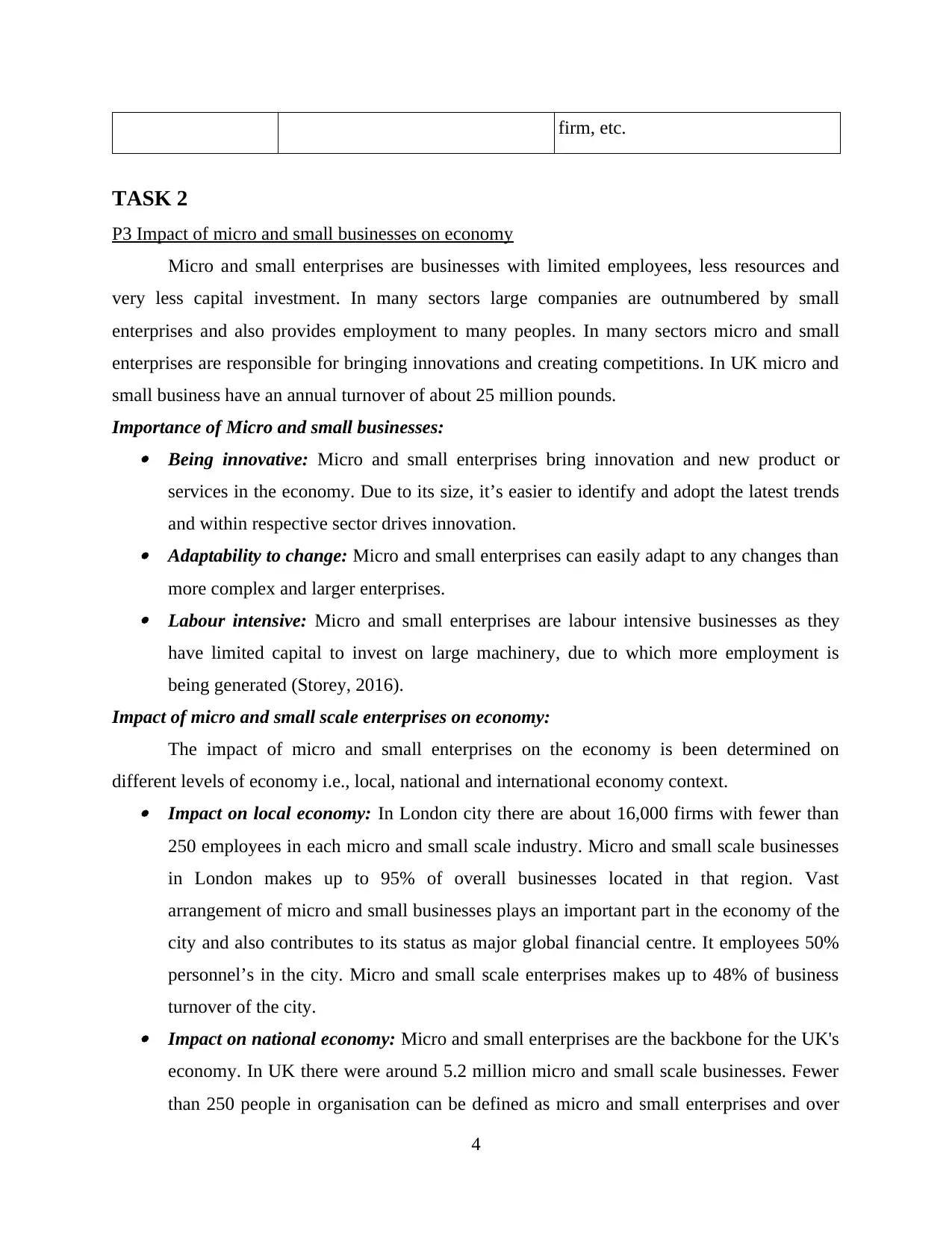
firm, etc.
TASK 2
P3 Impact of micro and small businesses on economy
Micro and small enterprises are businesses with limited employees, less resources and
very less capital investment. In many sectors large companies are outnumbered by small
enterprises and also provides employment to many peoples. In many sectors micro and small
enterprises are responsible for bringing innovations and creating competitions. In UK micro and
small business have an annual turnover of about 25 million pounds.
Importance of Micro and small businesses: Being innovative: Micro and small enterprises bring innovation and new product or
services in the economy. Due to its size, it’s easier to identify and adopt the latest trends
and within respective sector drives innovation. Adaptability to change: Micro and small enterprises can easily adapt to any changes than
more complex and larger enterprises. Labour intensive: Micro and small enterprises are labour intensive businesses as they
have limited capital to invest on large machinery, due to which more employment is
being generated (Storey, 2016).
Impact of micro and small scale enterprises on economy:
The impact of micro and small enterprises on the economy is been determined on
different levels of economy i.e., local, national and international economy context. Impact on local economy: In London city there are about 16,000 firms with fewer than
250 employees in each micro and small scale industry. Micro and small scale businesses
in London makes up to 95% of overall businesses located in that region. Vast
arrangement of micro and small businesses plays an important part in the economy of the
city and also contributes to its status as major global financial centre. It employees 50%
personnel’s in the city. Micro and small scale enterprises makes up to 48% of business
turnover of the city. Impact on national economy: Micro and small enterprises are the backbone for the UK's
economy. In UK there were around 5.2 million micro and small scale businesses. Fewer
than 250 people in organisation can be defined as micro and small enterprises and over
4
TASK 2
P3 Impact of micro and small businesses on economy
Micro and small enterprises are businesses with limited employees, less resources and
very less capital investment. In many sectors large companies are outnumbered by small
enterprises and also provides employment to many peoples. In many sectors micro and small
enterprises are responsible for bringing innovations and creating competitions. In UK micro and
small business have an annual turnover of about 25 million pounds.
Importance of Micro and small businesses: Being innovative: Micro and small enterprises bring innovation and new product or
services in the economy. Due to its size, it’s easier to identify and adopt the latest trends
and within respective sector drives innovation. Adaptability to change: Micro and small enterprises can easily adapt to any changes than
more complex and larger enterprises. Labour intensive: Micro and small enterprises are labour intensive businesses as they
have limited capital to invest on large machinery, due to which more employment is
being generated (Storey, 2016).
Impact of micro and small scale enterprises on economy:
The impact of micro and small enterprises on the economy is been determined on
different levels of economy i.e., local, national and international economy context. Impact on local economy: In London city there are about 16,000 firms with fewer than
250 employees in each micro and small scale industry. Micro and small scale businesses
in London makes up to 95% of overall businesses located in that region. Vast
arrangement of micro and small businesses plays an important part in the economy of the
city and also contributes to its status as major global financial centre. It employees 50%
personnel’s in the city. Micro and small scale enterprises makes up to 48% of business
turnover of the city. Impact on national economy: Micro and small enterprises are the backbone for the UK's
economy. In UK there were around 5.2 million micro and small scale businesses. Fewer
than 250 people in organisation can be defined as micro and small enterprises and over
4
⊘ This is a preview!⊘
Do you want full access?
Subscribe today to unlock all pages.

Trusted by 1+ million students worldwide
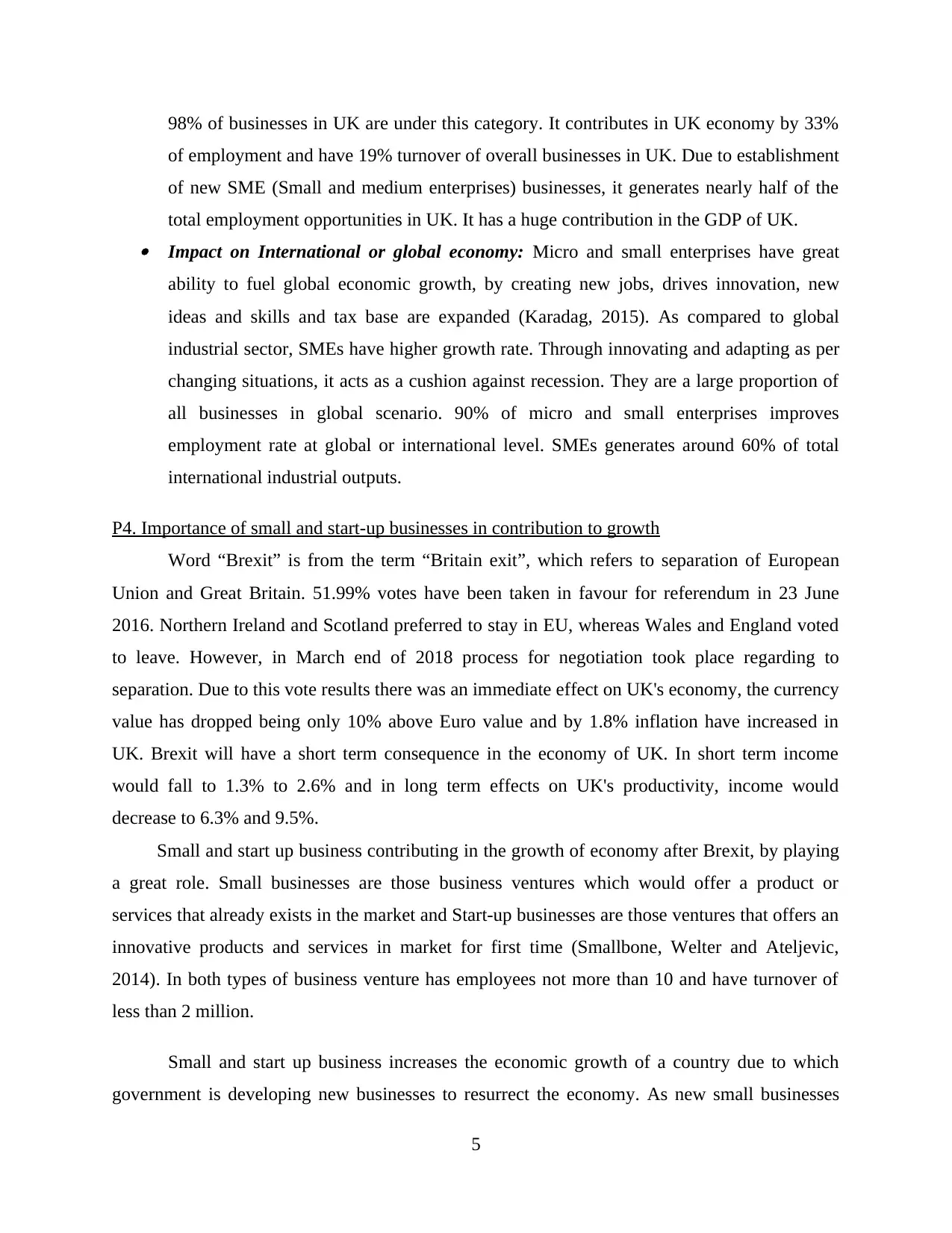
98% of businesses in UK are under this category. It contributes in UK economy by 33%
of employment and have 19% turnover of overall businesses in UK. Due to establishment
of new SME (Small and medium enterprises) businesses, it generates nearly half of the
total employment opportunities in UK. It has a huge contribution in the GDP of UK. Impact on International or global economy: Micro and small enterprises have great
ability to fuel global economic growth, by creating new jobs, drives innovation, new
ideas and skills and tax base are expanded (Karadag, 2015). As compared to global
industrial sector, SMEs have higher growth rate. Through innovating and adapting as per
changing situations, it acts as a cushion against recession. They are a large proportion of
all businesses in global scenario. 90% of micro and small enterprises improves
employment rate at global or international level. SMEs generates around 60% of total
international industrial outputs.
P4. Importance of small and start-up businesses in contribution to growth
Word “Brexit” is from the term “Britain exit”, which refers to separation of European
Union and Great Britain. 51.99% votes have been taken in favour for referendum in 23 June
2016. Northern Ireland and Scotland preferred to stay in EU, whereas Wales and England voted
to leave. However, in March end of 2018 process for negotiation took place regarding to
separation. Due to this vote results there was an immediate effect on UK's economy, the currency
value has dropped being only 10% above Euro value and by 1.8% inflation have increased in
UK. Brexit will have a short term consequence in the economy of UK. In short term income
would fall to 1.3% to 2.6% and in long term effects on UK's productivity, income would
decrease to 6.3% and 9.5%.
Small and start up business contributing in the growth of economy after Brexit, by playing
a great role. Small businesses are those business ventures which would offer a product or
services that already exists in the market and Start-up businesses are those ventures that offers an
innovative products and services in market for first time (Smallbone, Welter and Ateljevic,
2014). In both types of business venture has employees not more than 10 and have turnover of
less than 2 million.
Small and start up business increases the economic growth of a country due to which
government is developing new businesses to resurrect the economy. As new small businesses
5
of employment and have 19% turnover of overall businesses in UK. Due to establishment
of new SME (Small and medium enterprises) businesses, it generates nearly half of the
total employment opportunities in UK. It has a huge contribution in the GDP of UK. Impact on International or global economy: Micro and small enterprises have great
ability to fuel global economic growth, by creating new jobs, drives innovation, new
ideas and skills and tax base are expanded (Karadag, 2015). As compared to global
industrial sector, SMEs have higher growth rate. Through innovating and adapting as per
changing situations, it acts as a cushion against recession. They are a large proportion of
all businesses in global scenario. 90% of micro and small enterprises improves
employment rate at global or international level. SMEs generates around 60% of total
international industrial outputs.
P4. Importance of small and start-up businesses in contribution to growth
Word “Brexit” is from the term “Britain exit”, which refers to separation of European
Union and Great Britain. 51.99% votes have been taken in favour for referendum in 23 June
2016. Northern Ireland and Scotland preferred to stay in EU, whereas Wales and England voted
to leave. However, in March end of 2018 process for negotiation took place regarding to
separation. Due to this vote results there was an immediate effect on UK's economy, the currency
value has dropped being only 10% above Euro value and by 1.8% inflation have increased in
UK. Brexit will have a short term consequence in the economy of UK. In short term income
would fall to 1.3% to 2.6% and in long term effects on UK's productivity, income would
decrease to 6.3% and 9.5%.
Small and start up business contributing in the growth of economy after Brexit, by playing
a great role. Small businesses are those business ventures which would offer a product or
services that already exists in the market and Start-up businesses are those ventures that offers an
innovative products and services in market for first time (Smallbone, Welter and Ateljevic,
2014). In both types of business venture has employees not more than 10 and have turnover of
less than 2 million.
Small and start up business increases the economic growth of a country due to which
government is developing new businesses to resurrect the economy. As new small businesses
5
Paraphrase This Document
Need a fresh take? Get an instant paraphrase of this document with our AI Paraphraser
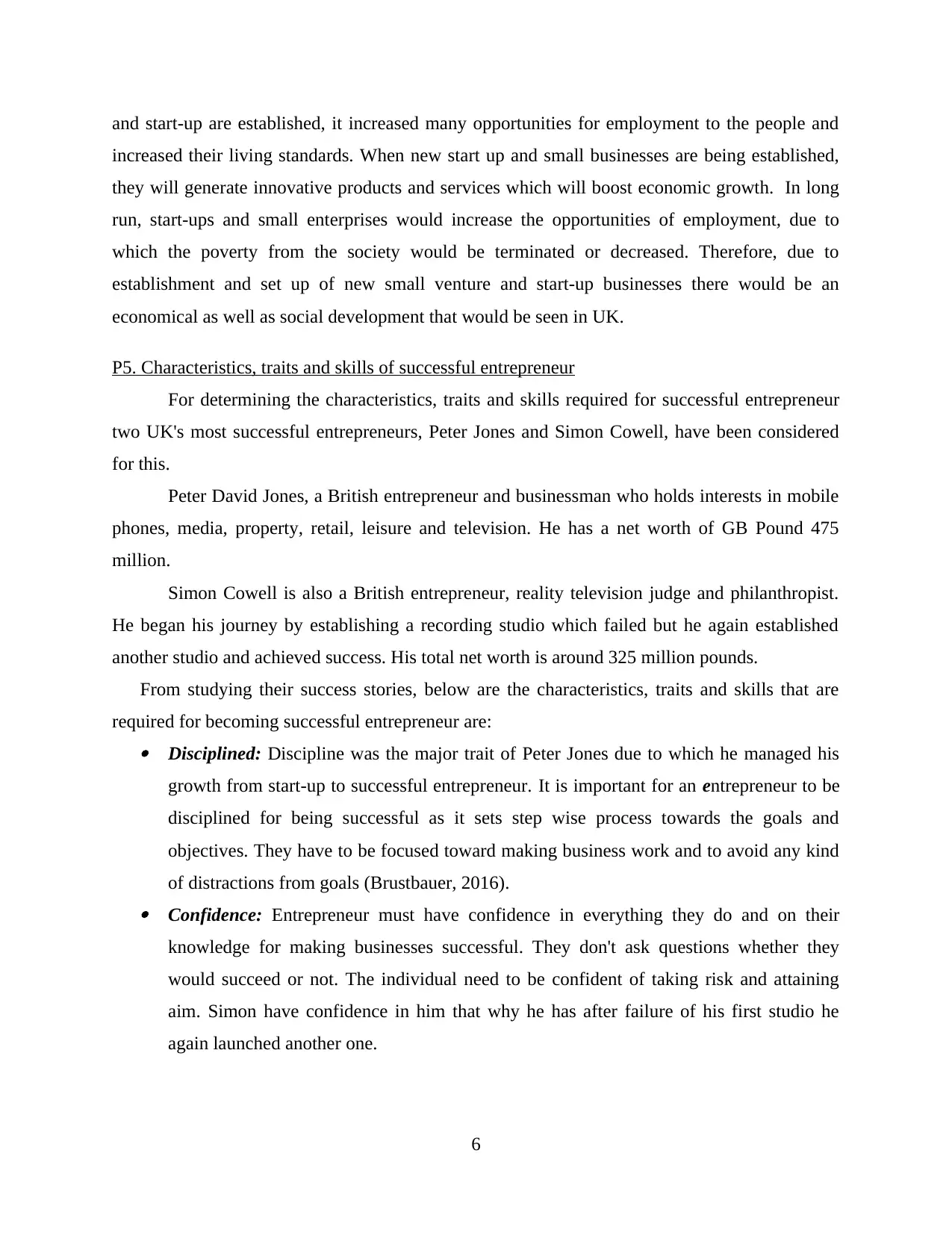
and start-up are established, it increased many opportunities for employment to the people and
increased their living standards. When new start up and small businesses are being established,
they will generate innovative products and services which will boost economic growth. In long
run, start-ups and small enterprises would increase the opportunities of employment, due to
which the poverty from the society would be terminated or decreased. Therefore, due to
establishment and set up of new small venture and start-up businesses there would be an
economical as well as social development that would be seen in UK.
P5. Characteristics, traits and skills of successful entrepreneur
For determining the characteristics, traits and skills required for successful entrepreneur
two UK's most successful entrepreneurs, Peter Jones and Simon Cowell, have been considered
for this.
Peter David Jones, a British entrepreneur and businessman who holds interests in mobile
phones, media, property, retail, leisure and television. He has a net worth of GB Pound 475
million.
Simon Cowell is also a British entrepreneur, reality television judge and philanthropist.
He began his journey by establishing a recording studio which failed but he again established
another studio and achieved success. His total net worth is around 325 million pounds.
From studying their success stories, below are the characteristics, traits and skills that are
required for becoming successful entrepreneur are: Disciplined: Discipline was the major trait of Peter Jones due to which he managed his
growth from start-up to successful entrepreneur. It is important for an entrepreneur to be
disciplined for being successful as it sets step wise process towards the goals and
objectives. They have to be focused toward making business work and to avoid any kind
of distractions from goals (Brustbauer, 2016). Confidence: Entrepreneur must have confidence in everything they do and on their
knowledge for making businesses successful. They don't ask questions whether they
would succeed or not. The individual need to be confident of taking risk and attaining
aim. Simon have confidence in him that why he has after failure of his first studio he
again launched another one.
6
increased their living standards. When new start up and small businesses are being established,
they will generate innovative products and services which will boost economic growth. In long
run, start-ups and small enterprises would increase the opportunities of employment, due to
which the poverty from the society would be terminated or decreased. Therefore, due to
establishment and set up of new small venture and start-up businesses there would be an
economical as well as social development that would be seen in UK.
P5. Characteristics, traits and skills of successful entrepreneur
For determining the characteristics, traits and skills required for successful entrepreneur
two UK's most successful entrepreneurs, Peter Jones and Simon Cowell, have been considered
for this.
Peter David Jones, a British entrepreneur and businessman who holds interests in mobile
phones, media, property, retail, leisure and television. He has a net worth of GB Pound 475
million.
Simon Cowell is also a British entrepreneur, reality television judge and philanthropist.
He began his journey by establishing a recording studio which failed but he again established
another studio and achieved success. His total net worth is around 325 million pounds.
From studying their success stories, below are the characteristics, traits and skills that are
required for becoming successful entrepreneur are: Disciplined: Discipline was the major trait of Peter Jones due to which he managed his
growth from start-up to successful entrepreneur. It is important for an entrepreneur to be
disciplined for being successful as it sets step wise process towards the goals and
objectives. They have to be focused toward making business work and to avoid any kind
of distractions from goals (Brustbauer, 2016). Confidence: Entrepreneur must have confidence in everything they do and on their
knowledge for making businesses successful. They don't ask questions whether they
would succeed or not. The individual need to be confident of taking risk and attaining
aim. Simon have confidence in him that why he has after failure of his first studio he
again launched another one.
6
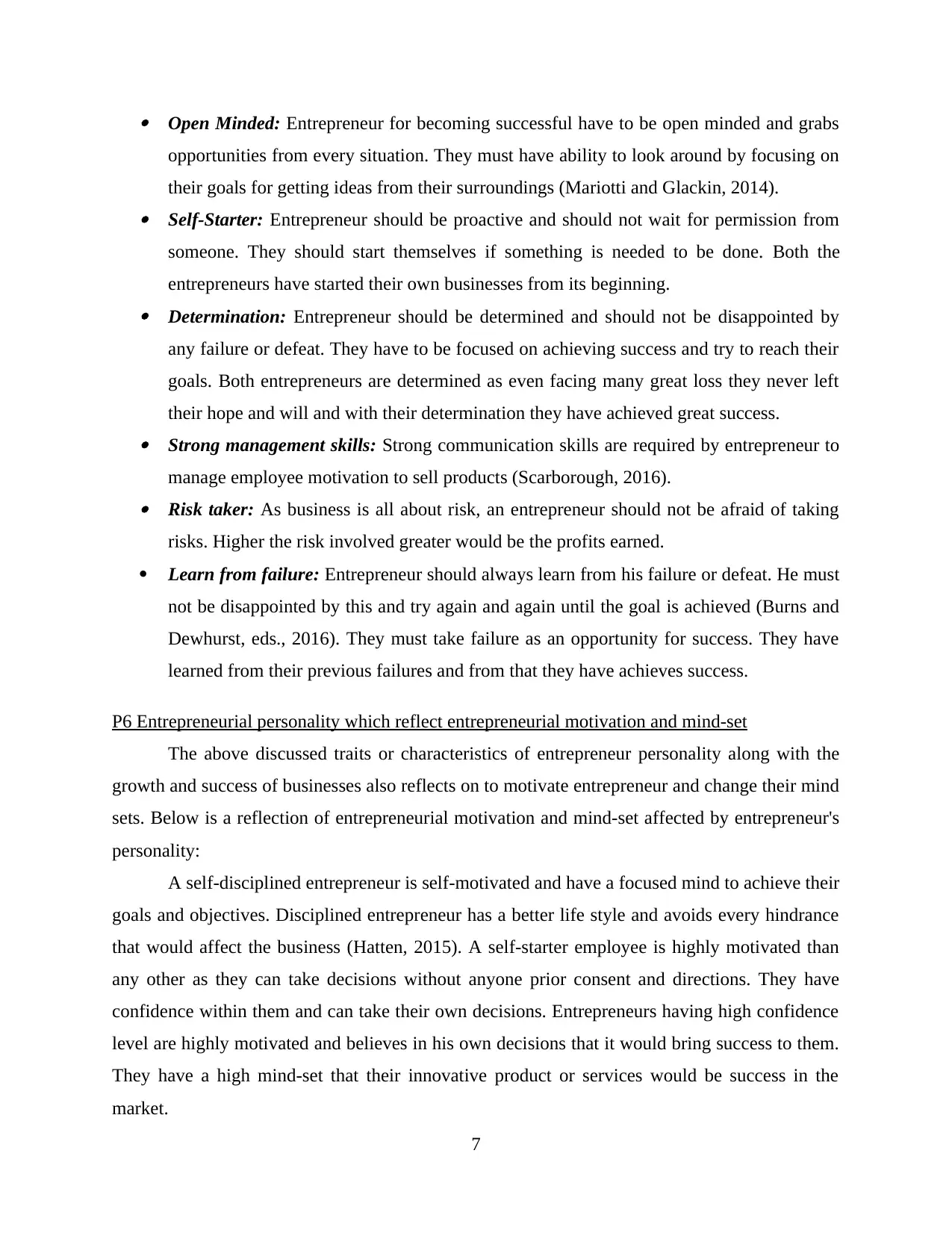
Open Minded: Entrepreneur for becoming successful have to be open minded and grabs
opportunities from every situation. They must have ability to look around by focusing on
their goals for getting ideas from their surroundings (Mariotti and Glackin, 2014). Self-Starter: Entrepreneur should be proactive and should not wait for permission from
someone. They should start themselves if something is needed to be done. Both the
entrepreneurs have started their own businesses from its beginning. Determination: Entrepreneur should be determined and should not be disappointed by
any failure or defeat. They have to be focused on achieving success and try to reach their
goals. Both entrepreneurs are determined as even facing many great loss they never left
their hope and will and with their determination they have achieved great success. Strong management skills: Strong communication skills are required by entrepreneur to
manage employee motivation to sell products (Scarborough, 2016). Risk taker: As business is all about risk, an entrepreneur should not be afraid of taking
risks. Higher the risk involved greater would be the profits earned.
Learn from failure: Entrepreneur should always learn from his failure or defeat. He must
not be disappointed by this and try again and again until the goal is achieved (Burns and
Dewhurst, eds., 2016). They must take failure as an opportunity for success. They have
learned from their previous failures and from that they have achieves success.
P6 Entrepreneurial personality which reflect entrepreneurial motivation and mind-set
The above discussed traits or characteristics of entrepreneur personality along with the
growth and success of businesses also reflects on to motivate entrepreneur and change their mind
sets. Below is a reflection of entrepreneurial motivation and mind-set affected by entrepreneur's
personality:
A self-disciplined entrepreneur is self-motivated and have a focused mind to achieve their
goals and objectives. Disciplined entrepreneur has a better life style and avoids every hindrance
that would affect the business (Hatten, 2015). A self-starter employee is highly motivated than
any other as they can take decisions without anyone prior consent and directions. They have
confidence within them and can take their own decisions. Entrepreneurs having high confidence
level are highly motivated and believes in his own decisions that it would bring success to them.
They have a high mind-set that their innovative product or services would be success in the
market.
7
opportunities from every situation. They must have ability to look around by focusing on
their goals for getting ideas from their surroundings (Mariotti and Glackin, 2014). Self-Starter: Entrepreneur should be proactive and should not wait for permission from
someone. They should start themselves if something is needed to be done. Both the
entrepreneurs have started their own businesses from its beginning. Determination: Entrepreneur should be determined and should not be disappointed by
any failure or defeat. They have to be focused on achieving success and try to reach their
goals. Both entrepreneurs are determined as even facing many great loss they never left
their hope and will and with their determination they have achieved great success. Strong management skills: Strong communication skills are required by entrepreneur to
manage employee motivation to sell products (Scarborough, 2016). Risk taker: As business is all about risk, an entrepreneur should not be afraid of taking
risks. Higher the risk involved greater would be the profits earned.
Learn from failure: Entrepreneur should always learn from his failure or defeat. He must
not be disappointed by this and try again and again until the goal is achieved (Burns and
Dewhurst, eds., 2016). They must take failure as an opportunity for success. They have
learned from their previous failures and from that they have achieves success.
P6 Entrepreneurial personality which reflect entrepreneurial motivation and mind-set
The above discussed traits or characteristics of entrepreneur personality along with the
growth and success of businesses also reflects on to motivate entrepreneur and change their mind
sets. Below is a reflection of entrepreneurial motivation and mind-set affected by entrepreneur's
personality:
A self-disciplined entrepreneur is self-motivated and have a focused mind to achieve their
goals and objectives. Disciplined entrepreneur has a better life style and avoids every hindrance
that would affect the business (Hatten, 2015). A self-starter employee is highly motivated than
any other as they can take decisions without anyone prior consent and directions. They have
confidence within them and can take their own decisions. Entrepreneurs having high confidence
level are highly motivated and believes in his own decisions that it would bring success to them.
They have a high mind-set that their innovative product or services would be success in the
market.
7
⊘ This is a preview!⊘
Do you want full access?
Subscribe today to unlock all pages.

Trusted by 1+ million students worldwide
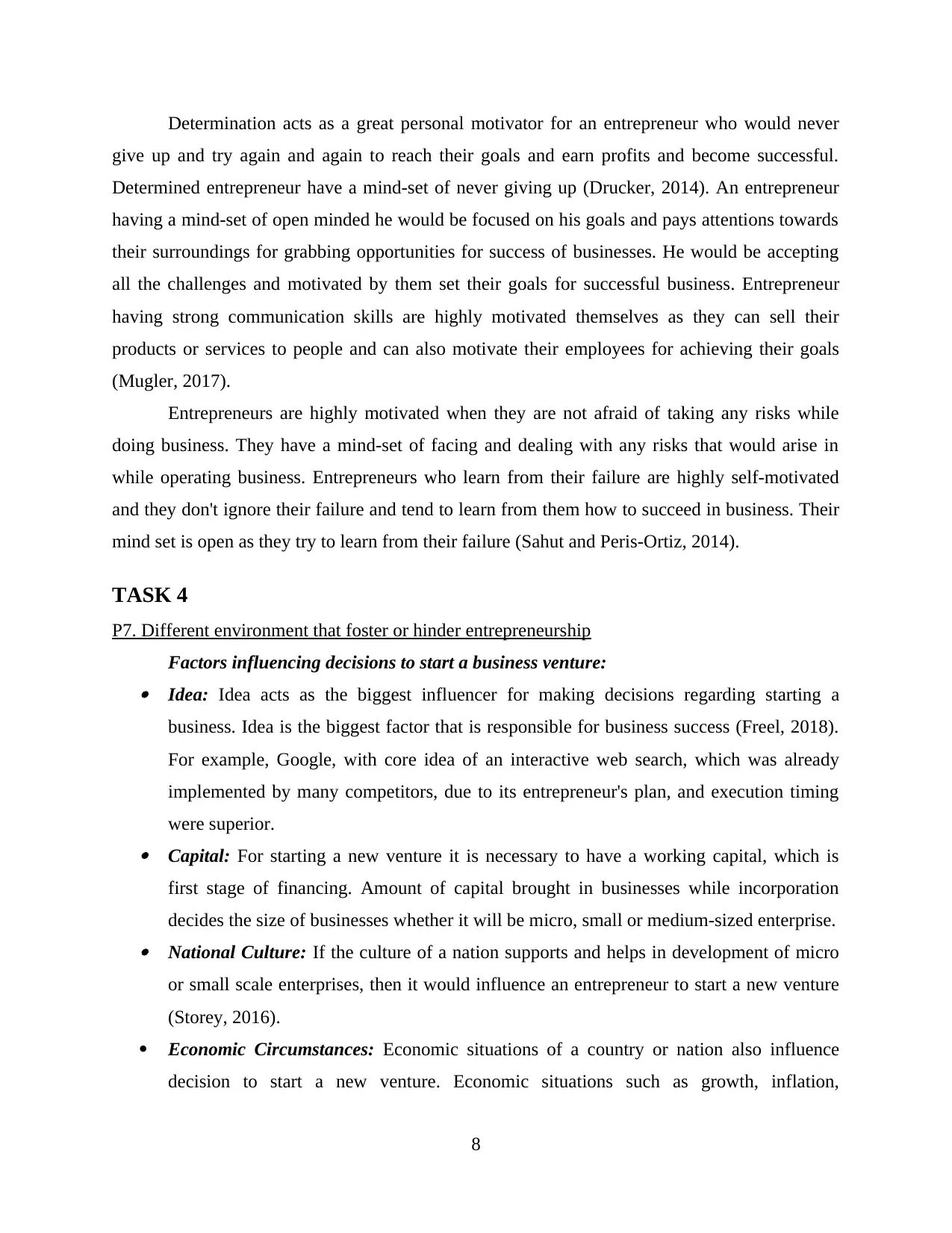
Determination acts as a great personal motivator for an entrepreneur who would never
give up and try again and again to reach their goals and earn profits and become successful.
Determined entrepreneur have a mind-set of never giving up (Drucker, 2014). An entrepreneur
having a mind-set of open minded he would be focused on his goals and pays attentions towards
their surroundings for grabbing opportunities for success of businesses. He would be accepting
all the challenges and motivated by them set their goals for successful business. Entrepreneur
having strong communication skills are highly motivated themselves as they can sell their
products or services to people and can also motivate their employees for achieving their goals
(Mugler, 2017).
Entrepreneurs are highly motivated when they are not afraid of taking any risks while
doing business. They have a mind-set of facing and dealing with any risks that would arise in
while operating business. Entrepreneurs who learn from their failure are highly self-motivated
and they don't ignore their failure and tend to learn from them how to succeed in business. Their
mind set is open as they try to learn from their failure (Sahut and Peris-Ortiz, 2014).
TASK 4
P7. Different environment that foster or hinder entrepreneurship
Factors influencing decisions to start a business venture: Idea: Idea acts as the biggest influencer for making decisions regarding starting a
business. Idea is the biggest factor that is responsible for business success (Freel, 2018).
For example, Google, with core idea of an interactive web search, which was already
implemented by many competitors, due to its entrepreneur's plan, and execution timing
were superior. Capital: For starting a new venture it is necessary to have a working capital, which is
first stage of financing. Amount of capital brought in businesses while incorporation
decides the size of businesses whether it will be micro, small or medium-sized enterprise. National Culture: If the culture of a nation supports and helps in development of micro
or small scale enterprises, then it would influence an entrepreneur to start a new venture
(Storey, 2016).
Economic Circumstances: Economic situations of a country or nation also influence
decision to start a new venture. Economic situations such as growth, inflation,
8
give up and try again and again to reach their goals and earn profits and become successful.
Determined entrepreneur have a mind-set of never giving up (Drucker, 2014). An entrepreneur
having a mind-set of open minded he would be focused on his goals and pays attentions towards
their surroundings for grabbing opportunities for success of businesses. He would be accepting
all the challenges and motivated by them set their goals for successful business. Entrepreneur
having strong communication skills are highly motivated themselves as they can sell their
products or services to people and can also motivate their employees for achieving their goals
(Mugler, 2017).
Entrepreneurs are highly motivated when they are not afraid of taking any risks while
doing business. They have a mind-set of facing and dealing with any risks that would arise in
while operating business. Entrepreneurs who learn from their failure are highly self-motivated
and they don't ignore their failure and tend to learn from them how to succeed in business. Their
mind set is open as they try to learn from their failure (Sahut and Peris-Ortiz, 2014).
TASK 4
P7. Different environment that foster or hinder entrepreneurship
Factors influencing decisions to start a business venture: Idea: Idea acts as the biggest influencer for making decisions regarding starting a
business. Idea is the biggest factor that is responsible for business success (Freel, 2018).
For example, Google, with core idea of an interactive web search, which was already
implemented by many competitors, due to its entrepreneur's plan, and execution timing
were superior. Capital: For starting a new venture it is necessary to have a working capital, which is
first stage of financing. Amount of capital brought in businesses while incorporation
decides the size of businesses whether it will be micro, small or medium-sized enterprise. National Culture: If the culture of a nation supports and helps in development of micro
or small scale enterprises, then it would influence an entrepreneur to start a new venture
(Storey, 2016).
Economic Circumstances: Economic situations of a country or nation also influence
decision to start a new venture. Economic situations such as growth, inflation,
8
Paraphrase This Document
Need a fresh take? Get an instant paraphrase of this document with our AI Paraphraser
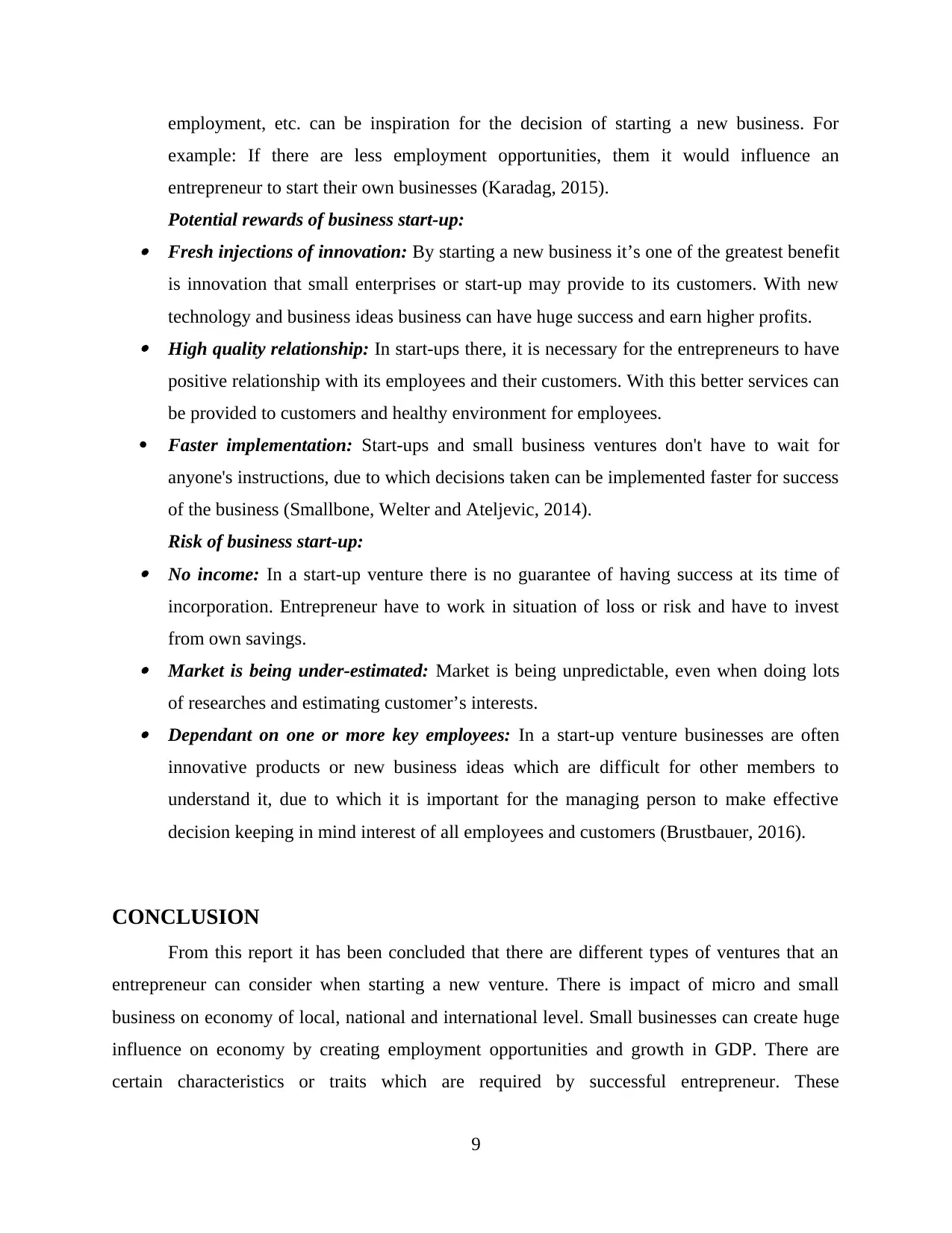
employment, etc. can be inspiration for the decision of starting a new business. For
example: If there are less employment opportunities, them it would influence an
entrepreneur to start their own businesses (Karadag, 2015).
Potential rewards of business start-up: Fresh injections of innovation: By starting a new business it’s one of the greatest benefit
is innovation that small enterprises or start-up may provide to its customers. With new
technology and business ideas business can have huge success and earn higher profits. High quality relationship: In start-ups there, it is necessary for the entrepreneurs to have
positive relationship with its employees and their customers. With this better services can
be provided to customers and healthy environment for employees.
Faster implementation: Start-ups and small business ventures don't have to wait for
anyone's instructions, due to which decisions taken can be implemented faster for success
of the business (Smallbone, Welter and Ateljevic, 2014).
Risk of business start-up: No income: In a start-up venture there is no guarantee of having success at its time of
incorporation. Entrepreneur have to work in situation of loss or risk and have to invest
from own savings. Market is being under-estimated: Market is being unpredictable, even when doing lots
of researches and estimating customer’s interests. Dependant on one or more key employees: In a start-up venture businesses are often
innovative products or new business ideas which are difficult for other members to
understand it, due to which it is important for the managing person to make effective
decision keeping in mind interest of all employees and customers (Brustbauer, 2016).
CONCLUSION
From this report it has been concluded that there are different types of ventures that an
entrepreneur can consider when starting a new venture. There is impact of micro and small
business on economy of local, national and international level. Small businesses can create huge
influence on economy by creating employment opportunities and growth in GDP. There are
certain characteristics or traits which are required by successful entrepreneur. These
9
example: If there are less employment opportunities, them it would influence an
entrepreneur to start their own businesses (Karadag, 2015).
Potential rewards of business start-up: Fresh injections of innovation: By starting a new business it’s one of the greatest benefit
is innovation that small enterprises or start-up may provide to its customers. With new
technology and business ideas business can have huge success and earn higher profits. High quality relationship: In start-ups there, it is necessary for the entrepreneurs to have
positive relationship with its employees and their customers. With this better services can
be provided to customers and healthy environment for employees.
Faster implementation: Start-ups and small business ventures don't have to wait for
anyone's instructions, due to which decisions taken can be implemented faster for success
of the business (Smallbone, Welter and Ateljevic, 2014).
Risk of business start-up: No income: In a start-up venture there is no guarantee of having success at its time of
incorporation. Entrepreneur have to work in situation of loss or risk and have to invest
from own savings. Market is being under-estimated: Market is being unpredictable, even when doing lots
of researches and estimating customer’s interests. Dependant on one or more key employees: In a start-up venture businesses are often
innovative products or new business ideas which are difficult for other members to
understand it, due to which it is important for the managing person to make effective
decision keeping in mind interest of all employees and customers (Brustbauer, 2016).
CONCLUSION
From this report it has been concluded that there are different types of ventures that an
entrepreneur can consider when starting a new venture. There is impact of micro and small
business on economy of local, national and international level. Small businesses can create huge
influence on economy by creating employment opportunities and growth in GDP. There are
certain characteristics or traits which are required by successful entrepreneur. These
9

entrepreneurial personalities also motivate and affects the mind set of entrepreneurs. There are
different factors which influences the decisions regarding starting of a new business. There are
certain potential rewards and risks that are been faced by new start-up business venture.
10
different factors which influences the decisions regarding starting of a new business. There are
certain potential rewards and risks that are been faced by new start-up business venture.
10
⊘ This is a preview!⊘
Do you want full access?
Subscribe today to unlock all pages.

Trusted by 1+ million students worldwide
1 out of 12
Related Documents
Your All-in-One AI-Powered Toolkit for Academic Success.
+13062052269
info@desklib.com
Available 24*7 on WhatsApp / Email
![[object Object]](/_next/static/media/star-bottom.7253800d.svg)
Unlock your academic potential
Copyright © 2020–2026 A2Z Services. All Rights Reserved. Developed and managed by ZUCOL.





